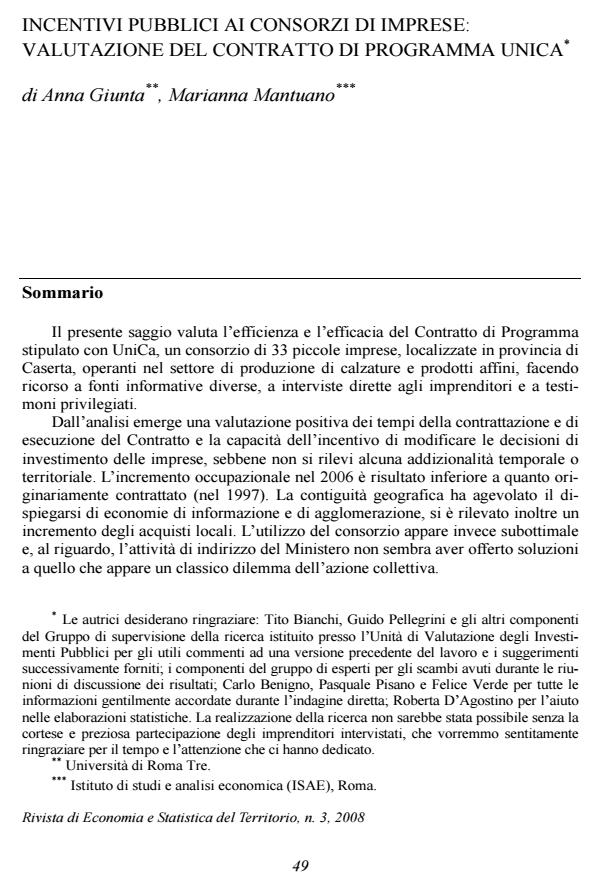Incentivi pubblici ai consorzi di imprese: valutazione del Contratto di Programma UniCa
Journal title RIVISTA DI ECONOMIA E STATISTICA DEL TERRITORIO
Author/s Anna Giunta, Marianna Mantuano
Publishing Year 2009 Issue 2008/3
Language Italian Pages 20 P. 49-68 File size 201 KB
DOI
DOI is like a bar code for intellectual property: to have more infomation
click here
Below, you can see the article first page
If you want to buy this article in PDF format, you can do it, following the instructions to buy download credits

FrancoAngeli is member of Publishers International Linking Association, Inc (PILA), a not-for-profit association which run the CrossRef service enabling links to and from online scholarly content.
Public Incentives to Firms Consortium: Evaluation of the UniCa Contratto di Programma - Objectives The aim of this paper is to assess both the efficiency and the efficacy of the Contratto di Programma drawn up with UniCa, a consortium of 33 small firms located in the province of Caserta, operating in the footwear industry. In particular, assessment will focus on: a) efficiency in terms of prompt implementation of the CdP; b) the socio-economic effects of incentives; c) the importance of incentives in modifying the choices of the consortium firms; d) the effective functionality of the consortium in the production of club goods. Methods and Results The case study methodology was applied. To this end use was made of various data sources and face-to-face interviews carried out in a period from November 2005 to March 2006, with sixteen firms, that had made use of the planning contract incentives, and well-informed observers. The article shows that: a) firms responded positively when questioned about the time taken for negotiation and implementation of the contract; b) the incentive had significant effect on the firms’ investment decisions, while no temporal or territorial additionality was observed; c) the 2006 increase in employment proved less than originally contracted for, while information and agglomeration economies were noted, as well as an increase in local purchases; d) suboptimal use of the consortium was noted: in fact, after five years’ operation by the UniCa consortium there was no evidence of production of club goods such as the UniCa brand, export consortium or acquisition of quality certification. Moreover, the article evidences very low Ministry guidance, showing incapacity to come up with any solutions to the classical dilemma facing collective action. Conclusions The paper concludes that corrective measures are called for in the design of the consortium planning contracts to enhance their efficacy. The need appears to be for planner self-investment in order to: a) achieve sound evaluation (ex-ante, in itinere, ex-post); b) guarantee that negotiation be conducted in such a way that the essential points of the policy maker’s aims can be achieved: additional investment, increased employment, generation of agglomeration external economies, and effective coordination of the agents’ activities for the production of club goods. In particular, bearing in mind that the time factor plays an important part in the success of a consortium, a deferred incentive structure should be created, correlated with the result the consortium achieves in the years subsequent to its constitution. At the same time, in order to avoid the maverick hazards of discretionality, procedure should not be too ad hoc. Thus the need would be for evaluation guidelines and reward criteria to be transparent and maintained for all the projects.
Anna Giunta, Marianna Mantuano, Incentivi pubblici ai consorzi di imprese: valutazione del Contratto di Programma UniCa in "RIVISTA DI ECONOMIA E STATISTICA DEL TERRITORIO" 3/2008, pp 49-68, DOI: